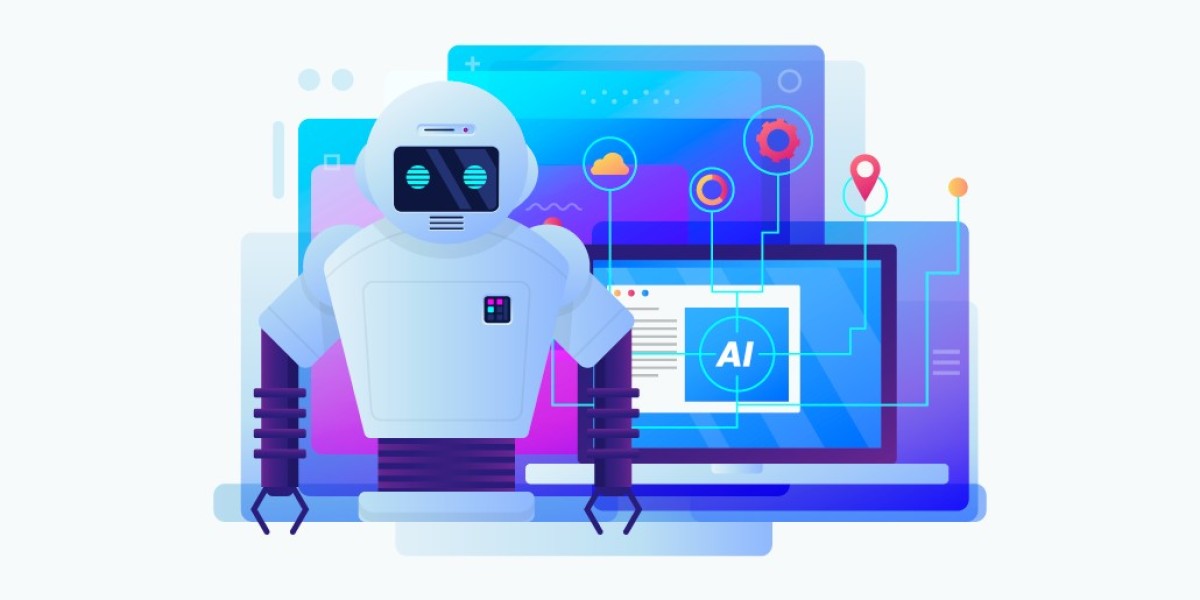Introduction
Along with the growing technology era, the symbiotic link between artificial intelligence (AI), machine learning (ML), and custom software development has become more evident. In the light of seeking innovation and efficiency by organizations, the incorporation of AI and ML into custom software development processes has changed the way the software is being designed, developed, and deployed. The comprehensive review addresses the AI and ML influence on the software development landscape, with an emphasis on the latest trends, the transformative effect on software development services companies, and the significant ramifications for the overall industry.
Software Development Trends: A Paradigm Shift
AI and ML propelled the fast-paced evolution of tech, and this usually occurred in Software Development Trends. These innovations have revolutionized software development as a whole by initiating a globally accepted change in the development process. Now these methodologies are in the process of being overhauled to meet the increasingly complex requirements of the 21st century's business environment. As a result, users are steadily growing AI and ML approach oriented in approach to problem-solving.
Agile and DevOps Integration:
For a long, agile methodologies worked as superheroes for their capability to accept change to implement their plans, and then revisit and restructure again and again. Nevertheless, the use of AI and ML in DevOps has ensured that there has been a tightening of the development and deployment life cycles thereby causing the velocity of software delivery to increase. Through automating monotonous assignments, predictive analysis, and continuous testing, AI-driven DevOps pipelines iron out the process of releasing high-quality software, thus increasing the effectiveness in combating errors and enabling collaboration among development and production teams.
Data-Centric Development:
The topic of big data will dictate the software development direction in the sense of data-centric methods. AI and ML algorithms are the key driving forces behind the method of human-centric application design from enormous amounts of data, which allows developers to create highly personalized, adaptive, and graspable application models. AI and ML-led data-driven development give software engineers the capability of discovering user's behavior in advance by application of predictive analytics and for semantic understanding the engineers use NLP. As a result, software engineers can design solutions that have intelligence and are specific to business needs.
Low-Code/No-Code Platforms:
In an attempt to fulfill the growing demand for fast development, low-code, and no-code platforms have evolved as feasible substitutes for conventional coding techniques. AI and ML embedded within these app development platforms speed up the application design, development, and redeployment; similar to no-code/low-code tools, citizen developers can launch simple applications without needing to be experts in coding. Participatory development, which combines the acceleration of the project timeline and the seeding of innovation, is the result of democratizing development and incorporating all actors of an organization into the software development process.
AI-Driven Testing and QA:
Quality assurance (QA), which is one of the critically important software development components, serves to verify that software is capable of performing at a required level, thus delivering stable and secure applications. AI and ML-based testing systems can perform test case generation, detection of abnormalities, and enhancement of test coverage all through predictive analytics, pattern discovery, and recognition. Using AI augmentation with manual testing, software development firms can save a lot of time in the release cycle without compromising on the quality of their products.
Ethical AI and Responsible Development:
As there is rising availability of AI applications nowadays, ethics and social implications of governance have paramount to be considered and AI development needs responsible practices to be followed. AI applications that are ethics-conscious are getting more prevalent in software development; Firms develop these to avoid bias and guarantee transparency and safety of user information. The developer of software should first put first ethical principles of AI, it will guarantee of trust of users, inclusiveness, and AI-based technologies implementation in each case with a social benefit perspective.
Software Development Services Company: Empowering Innovation with AI and ML
In the Software Development Services Company, fierce competition is on among the companies that use AI and ML as a way to differentiate themselves, to make innovations, and to deliver unmatched value to their clients. One can see a sharp growth in bespoke software solutions to the full-fledged AI-driven technologies of developing companies of software development services, which in turn solve the challenges and meet the changing needs of businesses of various sectors.
Custom Software Development:
Organizations in the business world are constantly seeking ways to better their performance but most of the time they turn to technology by investing in digital transformation where the need for custom software solutions that are specifically useful to individual organizations rises. AI software development services carry the development of highly individual application that automates working procedures, streamline business processes, and generate intelligent insights from data. Conquering the artificial intelligence-enabled custom software results in astounding speed and brains which in turn is what every business wants to stay in the lead nowadays in the market in constant change.
AI-Powered Business Intelligence:
BI (Business Intelligence) is a key factor for organizations that want to find valuable results which are from their data assets in an age of data which is the main source for management. Overcoming Barrier: The provider of software development services can utilize AI and ML algorithms to develop BI solutions, in real-time, to enable analytics, predictive modeling, and visualization of data. While organizations make use of AI-based BI tools, they can obtain a piece of deeper knowledge about market plans, consumers’ behavior, and also about competitive markets that will lead to good decision-making or growth.
Machine Learning Consulting Services:
If a firm, thus, is interested in taking the most out of machine learning, the software development service provider agencies have available ML models combined with consulting and health services which will drag the firm through the intricacies of ML model production, its deployment and optimization. From identifying use cases and data processing to selecting the algorithm and fine-tuning the performance, ML consulting companies offer customers the competence and guidance to design and implement that they can be confident will bring definite business benefits. Through cooperation with competent ML consultants, businesses can speed up their AI efforts which will allow for the creation of new gates to innovation improving the firm's market performance.
AI-Powered Automation:
Automation now occupies the most prominent position in digital transformation, with businesses able to simplify their operations, enhance their productivity, and reduce their costs. AI and ML-powered software development service providers build smart automation systems that take over the tasks that are done all the time, improve resource efficiency, and increase the productivity of the company as a whole. Whichever it is robotic process automation (RPA), cognitive automation, or intelligent document processing, AI-based automation solutions empower businesses to do the heavy lifting and improve decision-making, and thus they can focus on the strategic activities that drive overall business success.
AI-Driven Customer Experience:
The present period is characterized by the fact that the customer experience is of critical importance and through employing AI and ML, software development companies have an opportunity to design and provide the end-users with a tailored and altogether immersive and smooth experience. Artificial intelligence (AI) has found its way into customer service through intelligent chatbots, virtual assistants, recommendation engines, sentiment analysis algorithms, and so on, these AI-driven customer experience tools allow businesses to grasp customer sentiments and needs to create hyper-personalized interactions across multiple points of contact. Through harnessing the power of artificial intelligence-based customer experience methods, companies can improve and customize their relationship with their customers to create loyalty while standing out from the competition in the market.
Implications for the Broader Industry: Navigating the AI-Driven Future
AI and ML keep growing in popularity and strength and they are changing the face of Software Development Companies. The consequences of this fact cannot be given light. To name just a few aspects of business and individual success, the list includes talent screening, competencies development, regulatory compliance, and ethical considerations, that become the key competencies of the AI future.
Talent Acquisition and Skill Development:
The rise of Artificial Intelligence and Machine Learning has ignited the situation, which in turn triggered the hiring of individuals with specialized professional skills in data science, machine learning, and the development of AI. Software development companies are spending on recruitment and skill enhancement activities that can be utilized efficiently to create highly skilled teams to accomplish the optimal advantages of AI and ML technologies. From training current staff for AI, and ML competency to searching for advanced employees with AI, and ML skillsets, businesses are focusing on talent development as a critical strategic initiative for sustaining competitiveness in the digital era.
Regulatory Compliance and Ethical Considerations:
As AI and ML technologies are embedded in more and more processes of software development, regulatory compliance, and ethical frameworks take a central stage. Companies have to operate in a complex legal environment of data privacy, algorithmic transparency, and bias mitigation to help AI-based solutions become not just compliant with legal and ethical standards but robust as well. Ethical AI frameworks, data governance practices that are robust, and an atmosphere of responsible innovation are some of the precautionary measures that organizations can take against risks and earn the trust of stakeholders.
Collaboration and Ecosystem Partnerships:
In the AI-driven time, relationships as a part of the ecosystem partnerships play a crucial role in innovative technology development and innovation promotion. Rival computer systems companies demonstrate future growth strategies via partnerships with tech partners, academia, and industry consortiums to enable the exchange of knowledge, best practices, and co-innovation of AI and ML initiatives. With a combination of shared skills and resources from diverse groups of stakeholders, companies can leverage the process of AI-based solutions to accelerate their adoption to solve the most critical social problems.
Continuous Learning and Adaptation:
In a dynamic tech-savvy world, ongoing learning and skill enhancement are a matter of intellectual vitality -- a good way to stay ahead of the game. Contemporary software development specialists have to realize that a growth mindset is crucial and that continuous learning is imperative to stay up to date with modern AI and ML technologies. Professionals can widen their horizons through attending conferences, workshops, online courses, and collaborative projects which will help them to enhance their knowledge, acquire a new set of abilities, and track evolving technologies in AI-driven software development.
Conclusion
Amazon ML is an example of a platform that allows the automation of data mining processes in the custom software development cycle. This is a watershed moment in the development of technology. The AI and ML applications to traditional software development methodologies have thus been very significant in that they enable businesses to realize the value of AI and ML-driven products. Along with the growing number of businesses on AI, software development services are not just playing their part but are acting as primary agents to drive technology advancements, foster innovation, and ultimately influence the growth of the industry. AI and ML have enabled companies to discover new ways for growth, diversification, and competitiveness through the capture of competitive advantage in a dynamic economy.



